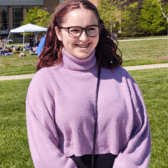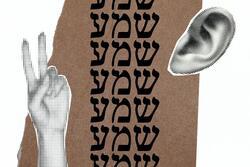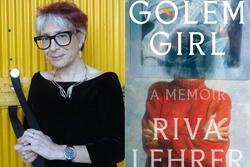How My ADHD Connected Me to Judaism
I have distinct memories of hiding books in siddurim, hiding under the coat room counter, and sneaking into my synagogue’s library for more reading material when my book was discovered and promptly confiscated. I think back to being yelled at for having to “go to the bathroom” too much (I was going for walks), shaking my hands and legs, or clicking my nails against the seat rest when I was forced to sit still without a book. I remember shoveling down my food so I could run off to play gaga in the basement or putting a book in my lap and ignoring the conversation.
Looking back now, the constant fidgeting was hyperactivity, and the constant need to read was inattentiveness, both common symptoms of ADHD (attention deficit hyperactivity disorder). In 2021, I started seeing a therapist who specializes in treating girls with ADHD, and she was the one who diagnosed me last year. I felt relieved to finally receive this diagnosis. For sixteen years, I did not understand why I struggled to do the same things other people could do without a second thought. I am not the only girl who has struggled with ADHD without a diagnosis for many years. In fact, I am one of the lucky ones. Most women with ADHD are not diagnosed until their late 30s or early 40s. I consider this to be a societal failure, and a feminist issue.
There are two types of ADHD: hyperactive and inattentive. The hyperactive type is more common in men and is typically characterized by constant fidgeting, excessive movement and talking, and impulsiveness, among other symptoms. The inattentive type involves difficulty focusing, apparent carelessness and forgetfulness, struggles completing daily tasks, and a variety of other difficulties. I have the inattentive type of ADHD. Because this type is significantly more common among women, it has gone underrepresented and underdiagnosed, as many disorders or forms of disorders mainly experienced by women are.
The fact that my situation went so long undiagnosed, and that so many other women go undiagnosed, is not random. The medical industry has long centered the treatment of men. Thus, diagnoses that only affect women or present differently in women often go undiagnosed because the medical industry is unequipped to recognize and treat these issues. Consequently, women with these disorders experience a worsened quality of life. This is a feminist issue. Girls and women with ADHD and other often diagnosed disorders need the same specialized resources and support that their male counterparts receive.
For me, one of the most difficult parts of having ADHD has always been masking. Masking is a mechanism adopted by people with mental health issues to hide the existence or severity of a disorder and “fit in.” It typically consists of adopting mannerisms and behaviors to try to seem “normal.” Masking is deeply draining on a mental and emotional level because it requires constantly emulating behaviors and considering the next choice that a neurotypical person would make while managing the preexisting difficulties of having a disorder such as ADHD. When I mask, I constantly pay attention to everyone around me to read what they might do next so I can do the same. It is constantly being “on” mentally and emotionally, and results in constant emotional exhaustion.
As an escape, I began reading. At first, I would read Torah and Haftorah stories in my synagogue´s Etz Hayim Chumash. When I had made it through those stories (many times), my parents let me borrow books from the synagogue library. The first biblical story I read myself was Chayei Sarah, the story of the first Jewish woman, Sarah, the wife of Abraham. I chose that story because of our shared name, but I continued reading because of the lush, beautiful story of the first matriarch’s life. I remember reading creative narrative interpretations of the stories of Miriam and Hadassah, among countless other novels based on biblical narratives.
My ADHD gave me a constant desire for emotional escape, which allowed me to enter a world where I learned about my Jewish foremothers. I could not sit through three-hour-long morning services or stand still and contemplate for ten minutes during the Amidah, so I looked for other ways to partake in Judaism and honor the traditions of my ancestors.
By learning the stories of Jewish women before me, I became more connected with my own Judaism. I felt proud to be a Jewish woman. These stories fostered a love for the history of my people and pulled me deeper into my Judaism.
I returned to synagogue week after week (for far more years than I would have otherwise) so that I could investigate the nuances of each story. Eventually, I began to enjoy the prayer services and meditated during the Amidah, though I still pulled out a book as soon as the d'var Torah started. My love for books made me comfortable enough that I no longer struggled to sit through services the same way I struggled to sit through most things.
Without ADHD, I would not have gone to services since my bat mitzvah, I would have lost touch with my Jewish identity, and I would not have this story to share with you all. It originally was a roadblock to my practice and is now my greatest strength. ADHD fostered and encouraged my connection with Jewish stories, which grew into a connection to other aspects of Judaism.
Neurodivergent Jews live full Jewish lives and play an important role in the Jewish community. It's time the Jewish community embraced us, taking the time to learn about our experiences and offering us the accommodations we need to be full participants.
This piece was written as part of JWA’s Rising Voices Fellowship.







